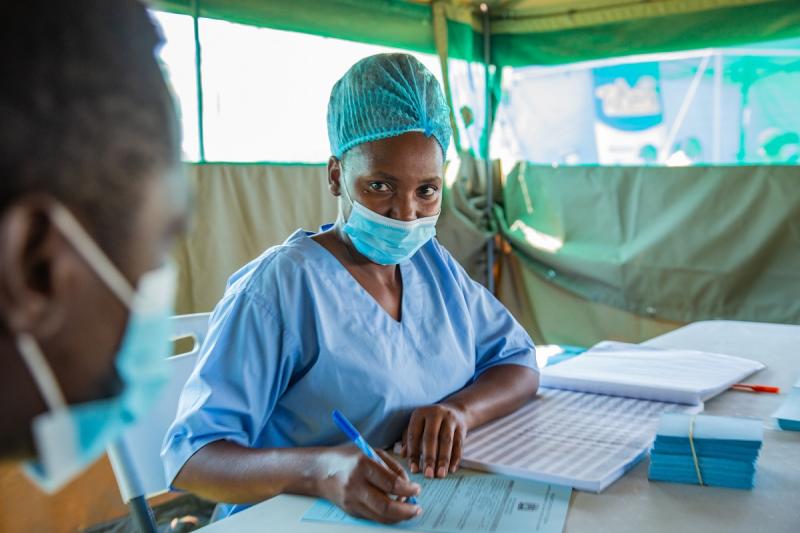Where We Work
See our interactive map


A health worker in Tanzania meets with a client. Photo by IntraHealth International.
At last week’s G7, progress toward a roadmap for the global COVID-19 vaccine drive was lacking. Here’s what health workers will need to make it a success.
The long-awaited plan from the US for sharing COVID-19 vaccines with countries that need them is an important step forward—both in US leadership and in our global response to COVID-19. I hope it inspires other countries to share more doses faster.
As the Group of 7 (G7) meeting unfolded in Cornwall, UK, last week, I was eager for these world leaders to take the plan even further, producing a roadmap for the COVID-19 vaccine rollout—our most extensive and ambitious vaccine effort in history. Here at IntraHealth International, we’re especially eager to see progress toward a detailed, multicountry plan to invest in and protect the only people in the world who can make the vaccine rollout happen: health workers.
Unfortunately, the G7 didn’t go far enough.
They did reaffirm their commitment to equitable vaccine distribution, including partnering with COVAX to share vaccines among the countries that need them. But we still don’t have a global roadmap to vaccinate the world, including a comprehensive approach to health care access and delivery that would help us achieve at least 70% coverage in all countries.
And there are some aspects of the US plan that trouble me—for example, it’s diverting $500 million in funds that the US had agreed to provide to Gavi to help countries deliver and administer their vaccines; instead of supporting health workers, those funds will now go toward buying Pfizer vaccines. The US should quickly find the funds to meet its original $500 million commitment to Gavi, to help health workers deliver on these global vaccine goals. [Author's note: A few days after this piece was published, we learned the great news that the $500 million in funds for Gavi to deliver and administer vaccines will proceed as planned.]
Health workers are the key to the entire vaccine effort. They must be at the center of it. That means putting them first in line around the world to receive COVID-19 vaccines and giving them the resources, person-power, and protection they need to get the job done, while at the same time continuing to offer other essential health services.
More than 115,000 health workers have died due to COVID-19 during the pandemic. If we don’t immediately provide health workers with the vaccine resources and supplies they need, that number will continue to rise, leaving communities without the ability to get vaccinated themselves.
The G7 and G20 must provide 1 billion doses by the end of August and 2 billion by the end of 2021 to achieve our global vaccine goals of 70% coverage—this means a significant monetary investment. Reaching even 20% of the population would take 1.1 million workers at a cost of $2.75 billion, the WHO currently estimates (a new comprehensive estimate is coming soon). Many countries already have severe health workforce shortages.
Last week, the G7 committed to investing in the health and care workforce worldwide to build capacity and keep health workers safe. But we must also see a monetary commitment from G7 countries to strengthen the health workforce and the systems in which they work. That’s one reason we’re joining our partners on the Frontline Health Workers Coalition in urging US Congress to include at least $100 million for the USAID Office of Health Systems in the Fiscal Year 2022 appropriations bill.
We’re also calling for full support to the health systems connector (the fourth pillar of the WHO’s ACT-Accelerator), which includes crucial support and safety equipment that allow health workers to do their jobs. This support should fill a gap of $7.4 billion, as well as any additional funding needed for vaccine delivery that is not budgeted for within the ACT-A.
“To end the pandemic, our shared goal must be to vaccinate at least 70% of the world’s population by the time the G7 meets again in Germany next year,” said WHO Director-General Dr. Tedros Adhanom Ghebreyesus this week. “I welcome the announcement that G7 countries will donate 870 million vaccine doses, primarily through COVAX. This is a big help, but we need more, and we need them faster. More than 10,000 people are dying every day.”
We must avoid situations in which countries are forced to discard vaccines because they lack sufficient personnel to administer them or educate communities about their safety. We must help prepare countries to surge staffing to manage the scale of this task and not take staff away from other urgent duties.
We must build back better together. To do that, health workers must receive vaccines immediately. And the world powers among the G7 must prioritize funding for health systems strengthening and vaccines for health workers—or we won’t beat this pandemic.
Get the latest updates from the blog and eNews




